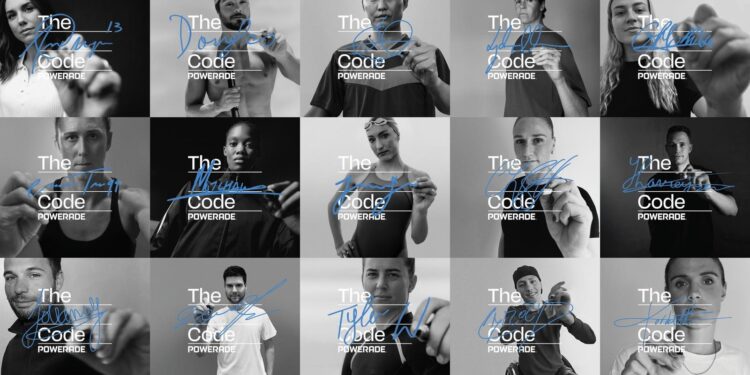The Athletes Code: Athlete Ambassadors
Powerade
In a move poised to redefine sports sponsorships, Powerade has unveiled The Athletes Code—a groundbreaking initiative that puts athletes’ mental health at the forefront. This contractual provision ensures athletes can take needed breaks without jeopardizing their sponsorships. This initiative builds on the 2022 “Pause is Power” platform, where Powerade continues to challenge the “win at all costs” mentality to protect athletes’ well-being. Up until this point, there have not been other brands that have provided similar contractual provisions with a focus on their athletes’ mental health.
Athletes at all levels are in high-pressure environments which often come with high expectations. This pressure to perform can have a negative impact on their mental health, sometimes demanding time away from their sport and obligations. Athletes like Simone Biles and Naomi Osaka have both taken breaks from their sport and returned with the same if not better performance in their respective sports. Those athletes with brand partnerships often worry about how their decisions might negatively impact these sponsorships. The Athletes Code provides a solution for this challenge by giving athletes the freedom to focus on their mental health without risking their partnerships.
Matrona Filippou, President, Global Hydration, Sports, Coffee & Tea for The Coca-Cola Company, sat down with me to discuss how The Athletes Code came to be. “When we introduced “Pause is Power” a few years ago, we challenged the norms of a ‘win at all costs’ mentality,” Filippou said. “We looked internally at our contracts and asked: why not include mental health alongside physical health? We put the power into athletes’ hands, allowing them to step away if they need to, without risk to their sponsorships.”
The Athletes Code is supported by Team Powerade, which consists of athletes from all over the world. Powerade selected Alex Morgan, Olympic Gold Medalist and World Cup Champion, as the face of The Athletes Code. “We loved Alex’s story,” said Filippou. “Her journey of stepping back and coming back stronger perfectly aligns with The Athletes Code. She’s an ideal ambassador for showing how mental health breaks can drive resilience and performance.” Morgan described the power of this contractual provision: “Powerade’s new commitment creates a platform that gives athletes the peace of mind to know they’ll be supported unconditionally.”
Alex Morgan
Powerade
Tatjana Smith, Olympic gold medalist swimmer and a proud ambassador of The Athletes Code spoke to me about why she was interested in joining this initiative. “Most of the time, sponsorships are based on performance, and you have to perform. If you’re not getting medals, you’re not putting food on the table,” she explained. “That’s a lot of pressure to perform, especially when your sport is what you do, not who you are. The Athletes Code provides a space to step back and prioritize who you are as a person,” said Smith.
The inclusion of mental health provisions in athlete contracts demonstrates a major shift in how brands engage with their partners. The Athletes Code shifts the sponsor-athlete relationship from transactional to truly supportive. Smith identified how this initiative builds authentic partnerships between athletes and brands. “It’s validation that they believe in you, believe in your dream, and trust you to know what you need to do to realize that dream. That belief can be really motivating to an athlete,” said Smith.
This is an important and bold move from Powerade, as they are seeing their athlete partners as a whole person, rather than as a commodity. “We’d love to see any brand with athlete partnerships recognize the immense physical and mental pressures athletes face and provide support,” Filippou said. This call to action is as bold as it is necessary, inviting other brands to join Powerade in rewriting the playbook on athlete care. Other brands, like Gatorade, have not gone as far as to include a contractual provision that protects their athlete partners, so the hope is that Powerade is leading the way for other brands to follow.
The Athletes Code’s contractual provision isn’t just about supporting today’s athletes—it’s shaping the future of sports sponsorships and mental health advocacy. As Smith eloquently put it: “Everyone has a story and the power to inspire others. This initiative helps athletes share their stories, prioritize their well-being, and create a ripple effect for future generations.” Powerade has set a new precedent for how athletes are valued and supported in their journey, both on and off the field. In the future, hopefully other brands will follow suit and apply similar contractual provisions, helping decrease the pressures on their athletes rather than adding to the high-demand environments.


